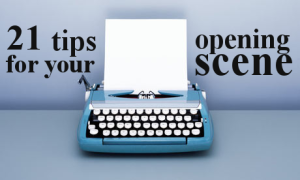The first page is your make-or-break moment. The 250 words in which your reader – be it a literary agent or bookstore browser – decides to either turn the page or close the book forever.
If you don’t emotionally engage your reader by page one, it’s over. This is the D in AIDA.

The D in AIDA
To find out how to hook and keep my readers (and your readers), I scoured the Internet for the best advice on first pages and first chapters.
Here’s a comprehensive overview of the best advice I found. (If confused, click the source link for a more detailed explanation.)
First of All
From “Moonrat,” a recovering editorial assistant:
- Assume your reader is in a terrible mood when they look at page one. This prospective agent has an endless stack of submissions to sift through, not to mention actual clients to attend to. You don’t have until page two.
The Do Nots
From Hilari Bell:
- Don’t open with scenery
- Don’t open with back story (aka “the data dump”)
- Don’t open in the middle of too much action
- Don’t open with more than three characters (three is already pushing it)
From various agents
- Don’t open with a dream or a flashback
- Don’t be flowery – minimize adjectives and adverbs
- Don’t open with a cliché – (see examples in the post)
From Livia Blackburne:
- Don’t start with weather unless it’s about meteorologists
- Avoid having the character think about something just so you can tell the reader about it (that’s telling, not showing).
From Hallie Ephron:
- Don’t start with a stolen prologue – you know, when your first page is boring, so you take the most exciting scene from the middle of the book, slap it at the beginning and call it the prologue
The Dos
From Anica Mrose Rissi:
- Start with conflict and tension – something going wrong (in love or in trouble on page one)
- Start with the story you’re telling, not the back story
From Nancy Kress:
- Introduce the protagonist – focus on the individual, not just a type: what is different about this person?
From Tara Lazar:
- Briefly set the scene, but be specific versus generic – what’s unique about this place?
From Hilari Bell:
- Set the tone of the story – is it sarcastic, dark, whimsical, suspenseful?
From Elizabeth Sims:
- Give it a mini plot – a first chapter so layered, concise, and complete that it feels like it could stand alone will make an awesome first chapter
From Nancy Kress:
- Understand the promises you are making your readers – both emotional and intellectual – and be prepared to follow through (will the ending meet the expectations you encouraged your readers to have in the beginning?)
Deciding Where to Begin
From Elizabeth Sims:
- Pick a scene you know you’re going to put in—even if you don’t know where. You might discover your Chapter One right there.
- Ask “what will the protagonist be doing when we first meet him?”
From James Scott Bell:
- Try cutting your current first scene and starting with the next one instead
Feeling overwhelmed?
Here’s a more structured look at how to compose your first pages, from Les Edgerton’s book, Hooked:
The Components of an Opening Scene
Primary (absolutely necessary):
- The inciting incident – event that creates the surface problem, setting the stage for the story-worthy problem
- The story-worthy problem – thing the character must solve by the end of the story
- The initial surface problem – result of the inciting incident, appears to be what the story is about, but isn’t
- The setup – a snapshot that will help the reader understand the next scene
Secondary (may not be necessary):
- Back story – include only what is absolutely necessary
- A stellar opening sentence – spend more time on this line than any other
- Language – use your best prose in the beginning
- Character – reveal a telling detail about your protagonist using action, not exposition
- Setting – ground your readers but don’t go overboard
- Foreshadowing – hint at action or obstacles to come
Test Your First Page
At Flogging the Quill, people submit their first pages to a “Flogometer,” where people read the page and vote to turn the page or not. Ray, who runs the site, also gives valuable feedback. It may take awhile to be featured if you submit, so I advise looking at the examples already posted there to see if any are similar to yours – and whether they made the cut.
—

This blogger scoured the web for the best advice on writing an opening scene.



